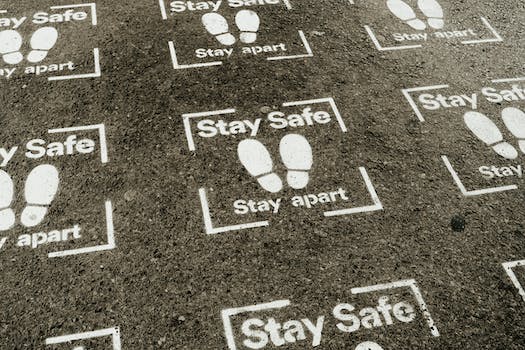Working remotely while traveling can be both exciting and challenging. With the freedom to work from anywhere, it’s important to stay productive and maintain a good work-life balance. In this article, we will share 10 valuable tips to help you stay focused and efficient while working remotely on the road. Whether you’re a digital nomad or a professional who occasionally works while traveling, these tips will surely enhance your productivity and make your journey more fulfilling.
- 1. 1. Create a Routine
- 1.1. Establish a consistent work schedule
- 1.2. Set clear goals and prioritize tasks
- 1.3. Allocate time for breaks and relaxation
- 1.4. Avoid multitasking
- 1.5. Create a productive workspace
- 2. 2. Stay Organized
- 2.1. Use productivity tools and apps
- 2.2. Maintain a to-do list
- 2.3. Keep your workspace clutter-free
- 2.4. Organize digital files and documents
- 2.5. Set reminders and deadlines
- 3. 3. Manage Distractions
1. 1. Create a Routine
Working remotely while traveling can be both exciting and challenging. To ensure that you stay productive while on the road, it is important to establish a routine. By creating a structured daily schedule, you can maintain focus and accomplish your tasks efficiently. Here are 10 tips for staying productive while working remotely on the road:
1.1. Establish a consistent work schedule
Establishing a consistent work schedule is crucial for staying productive while working remotely on the road. Without a routine, it can be easy to get distracted or lose track of time. Here are some tips to help you create a routine that works for you:
1. Set specific work hours: Determine the hours of the day when you will be most focused and productive. This could be in the morning, afternoon, or evening. Stick to these hours as much as possible to create a sense of structure.
2. Designate a workspace: Find a dedicated space where you can work comfortably and minimize distractions. This could be a quiet corner in your RV, a coffee shop with reliable Wi-Fi, or a co-working space.
3. Plan your tasks: Start each day by outlining the tasks you need to accomplish. Prioritize them based on importance and deadlines. This will help you stay organized and focused throughout the day.
4. Take regular breaks: It’s important to give yourself short breaks to recharge and avoid burnout. Schedule short breaks between tasks or set specific times for longer breaks throughout the day.
5. Minimize distractions: Identify potential distractions and find ways to minimize their impact. Turn off notifications on your phone, use website blockers to limit access to social media, or use noise-canceling headphones to drown out background noise.
6. Practice time management: Use time management techniques such as the Pomodoro Technique or time blocking to improve your productivity. Break your work into smaller tasks and allocate specific time slots for each task.
7. Stay organized: Keep your workspace neat and organized. Use digital tools like project management software, cloud storage, or note-taking apps to keep track of your tasks, deadlines, and important information.
8. Maintain a healthy work-life balance: It’s easy to blur the lines between work and personal life when you’re working remotely. Set boundaries and prioritize self-care. Make time for activities outside of work to avoid burnout.
9. Communicate with your team: If you’re working remotely as part of a team, stay connected and communicate regularly. Use video conferencing tools, instant messaging, or project management platforms to collaborate effectively.
10. Reflect and adjust: Regularly evaluate your routine and make adjustments as needed. Pay attention to what works best for you and make changes accordingly to optimize your productivity and work-life balance.
1.2. Set clear goals and prioritize tasks
When working remotely on the road, it is important to set clear goals and prioritize tasks. Without a routine, it can be easy to get overwhelmed and lose focus. Here are some tips to help you create a routine and stay productive:
1. Define your goals: Start by determining what you want to achieve during your remote work. Set clear, specific, and achievable goals that align with your overall objectives.
2. Prioritize tasks: Once you have defined your goals, prioritize your tasks based on their importance and urgency. This will help you stay focused and ensure that you are working on the most important tasks first.
3. Break tasks into smaller steps: Large projects can be daunting, so break them down into smaller, more manageable tasks. This will make it easier to tackle them and give you a sense of progress as you complete each step.
4. Create a schedule: Establish a daily or weekly schedule that outlines when you will work on specific tasks. This will provide structure and help you allocate time effectively.
5. Set deadlines: Assign deadlines to each task to create a sense of urgency and accountability. Be realistic with your deadlines, but also push yourself to stay on track.
6. Eliminate distractions: Minimize distractions in your work environment by finding a quiet and dedicated space. Turn off notifications on your phone or computer and avoid non-work-related websites or apps.
7. Take regular breaks: Breaks are essential for maintaining productivity and focus. Schedule short breaks throughout the day to rest and recharge, but make sure to stick to the allocated break times.
8. Stay organized: Keep your workspace clean and clutter-free. Use productivity tools, such as to-do lists or project management software, to stay organized and track your progress.
9. Communicate and collaborate: Working remotely doesn’t mean working alone. Stay connected with your team or clients through communication tools and collaborate effectively to achieve common goals.
10. Reflect and adjust: Regularly assess your productivity and make adjustments to your routine if necessary. Identify what works best for you and make changes accordingly to optimize your remote work experience.
By setting clear goals and establishing a routine, you can enhance your productivity while working remotely on the road.
1.3. Allocate time for breaks and relaxation
In order to stay productive while working remotely on the road, it is important to allocate time for breaks and relaxation. Although it may seem counterintuitive, taking regular breaks can actually improve productivity and overall well-being. When creating a routine for remote work, make sure to schedule designated break times throughout the day. This can include short breaks to stretch or walk around, as well as longer breaks for meals or leisure activities. By allowing yourself regular breaks, you can recharge your mind and body, preventing burnout and increasing focus when you return to work. Additionally, incorporating relaxation techniques such as deep breathing exercises or meditation during these breaks can further enhance productivity and reduce stress. Remember, breaks are not a waste of time but rather an essential part of maintaining productivity and work-life balance while working remotely on the road.
1.4. Avoid multitasking
Avoid multitasking. It may be tempting to try and juggle multiple tasks at once, but this can actually decrease productivity. When you divide your attention between different tasks, it becomes harder to focus and complete each one efficiently. Instead, try to focus on one task at a time and give it your full attention. This will allow you to work more effectively and produce higher quality results.
1.5. Create a productive workspace
Creating a productive workspace is essential for staying focused and efficient while working remotely. Whether you’re on the road or working from home, establishing a routine can help you maintain a sense of structure and increase productivity.
Here are some tips to help you create a routine for a productive workspace:
1. Set a consistent schedule: Determine your working hours and stick to them. Having a set routine will train your mind to be in work mode during those hours.
2. Designate a dedicated workspace: Find a quiet and comfortable space where you can work without distractions. This could be a separate room, a corner of your home, or a co-working space while on the road.
3. Organize your tools and supplies: Keep your workspace tidy and well-organized. Have all the necessary tools, such as your laptop, chargers, notebooks, and pens, easily accessible.
4. Eliminate distractions: Minimize any potential distractions that can hinder your productivity. Turn off notifications on your phone, close unnecessary tabs on your browser, and let others know when you need uninterrupted time.
5. Prioritize tasks: Create a to-do list or use a task management tool to prioritize your tasks for the day. This will help you stay focused on what needs to be done and avoid feeling overwhelmed.
6. Take regular breaks: Break up your workday with short breaks to rest and recharge. This can include stretching, going for a walk, or simply taking a few minutes to relax and clear your mind.
7. Stay organized digitally: Use digital tools like cloud storage, project management software, and note-taking apps to keep your files and tasks organized. This will save you time and make it easier to find what you need.
8. Establish boundaries: Communicate your work schedule and boundaries with others, whether it’s your family, friends, or travel companions. Let them know when you need uninterrupted time and when you’re available for socializing.
9. Set goals and track progress: Set achievable goals for each day or week and track your progress. This will help you stay motivated and give you a sense of accomplishment as you complete tasks.
10. Practice self-care: Take care of your physical and mental well-being. Get enough sleep, eat nutritious meals, exercise regularly, and make time for activities that help you relax and recharge.
By following these tips and creating a routine, you can create a productive workspace that allows you to stay focused, motivated, and efficient while working remotely on the road.
2. 2. Stay Organized
When working remotely on the road, staying organized is crucial for maintaining productivity. Here are some tips to help you stay organized and focused:
1. Set up a designated workspace: Having a dedicated area for work will help you separate your professional and personal life. It could be a corner in your hotel room, a coffee shop, or even a co-working space.
2. Create a schedule: Plan out your day and allocate specific time slots for different tasks. This will help you prioritize your work and ensure that you stay on track.
3. Use productivity tools: Take advantage of various productivity tools and apps available to help you stay organized. These can include project management software, task trackers, and time management apps.
4. Minimize distractions: Working remotely can be challenging due to the potential for distractions. Try to minimize them by turning off notifications on your phone or computer, using noise-cancelling headphones, and finding a quiet and comfortable workspace.
5. Prioritize your tasks: Identify the most important tasks and tackle them first. This will help you make progress on your work and avoid feeling overwhelmed.
6. Take regular breaks: It’s essential to give yourself breaks to recharge and avoid burnout. Schedule short breaks throughout the day to stretch, go for a walk, or do something enjoyable.
7. Stay connected: Working remotely doesn’t mean you have to be isolated. Stay connected with your team through video calls, instant messaging, or regular check-ins to maintain collaboration and communication.
8. Keep a to-do list: Write down your daily tasks and cross them off as you complete them. This will give you a sense of accomplishment and help you stay organized.
9. Have a backup plan: It’s always a good idea to have a backup plan in case of unexpected situations. This could include having backup internet access, saving your work on cloud storage, or having alternative workspaces in mind.
10. Maintain a healthy work-life balance: Remote work can blur the boundaries between work and personal life. Set boundaries and establish a routine that allows you to have dedicated time for work and personal activities.
By staying organized and following these tips, you can enhance your productivity while working remotely on the road.
2.1. Use productivity tools and apps
In order to stay productive while working remotely on the road, it is essential to use productivity tools and apps. These tools can help you stay organized, manage your time effectively, and streamline your tasks. Here are some recommended productivity tools and apps that can enhance your remote work experience:
1. Project Management Tools: Tools like Trello, Asana, and Monday.com can help you keep track of your tasks, set deadlines, and collaborate with team members.
2. Time Tracking Apps: Apps like Toggl and RescueTime can help you monitor how you spend your time, identify time-wasting activities, and improve your productivity.
3. Communication Tools: Tools like Slack, Microsoft Teams, and Zoom can facilitate seamless communication with team members, clients, and stakeholders.
4. File Storage and Sharing Tools: Cloud-based tools like Google Drive, Dropbox, and OneDrive enable easy access to your files, allow for collaborative work, and ensure data security.
5. Note-taking Apps: Apps like Evernote and OneNote provide a convenient way to jot down ideas, capture important information, and stay organized.
6. Password Managers: Tools like LastPass and Dashlane can securely store your passwords, making it easier to log in to various accounts without the need to remember multiple passwords.
7. Email Management Tools: Tools like Gmail, Outlook, and MailChimp help you organize your emails, set up filters, and automate certain tasks, saving you time and reducing email overload.
8. Focus and Productivity Apps: Apps like Forest, Freedom, and RescueTime can help you minimize distractions, stay focused on your work, and manage your online habits.
9. Virtual Meeting Tools: Tools like GoToMeeting, Cisco Webex, and Skype enable virtual meetings, conferences, and webinars, allowing for effective collaboration regardless of location.
10. Task Automation Tools: Tools like IFTTT, Zapier, and Microsoft Flow can automate repetitive tasks, integrate different apps and tools, and boost your overall productivity.
By incorporating these productivity tools and apps into your remote work routine, you can optimize your efficiency, stay organized, and accomplish your tasks more effectively.
2.2. Maintain a to-do list
One essential tool for staying productive while working remotely on the road is maintaining a to-do list. This simple yet effective practice helps you stay organized and prioritize your tasks. By creating a to-do list, you can easily keep track of what needs to be done and ensure that nothing falls through the cracks. It also allows you to plan your day and allocate time to each task accordingly. Whether you prefer a digital or physical to-do list, make sure to update it regularly and cross off completed tasks to give yourself a sense of accomplishment. Additionally, consider using tools or apps that offer reminders and notifications to help you stay on track with your to-do list.
2.3. Keep your workspace clutter-free
Keeping your workspace clutter-free is essential for maintaining productivity while working remotely. A cluttered workspace can be distracting and make it difficult to focus on your tasks. Here are some tips to help you keep your workspace organized:
1. Declutter regularly: Take some time each day to remove any unnecessary items from your workspace. This will help create a clean and organized environment.
2. Use storage solutions: Invest in storage containers, shelves, or filing systems to keep your supplies and documents neatly organized. This will make it easier to find what you need and avoid clutter.
3. Keep a clean desktop: Avoid cluttering your computer desktop with numerous icons and files. Instead, create folders and organize your digital files systematically.
4. Optimize your physical space: Arrange your desk and furniture in a way that maximizes space and promotes efficient workflow. Keep frequently used items within easy reach.
5. Minimize distractions: Remove any non-essential items or decorations from your workspace that may distract you from your work. Create a dedicated and focused environment.
6. Implement a filing system: Establish a system for organizing your physical and digital documents. Use labels or color-coding for easy identification.
7. Prioritize tasks: Keep a to-do list or use project management tools to prioritize and track your tasks. This will help you stay organized and focused.
8. Clear your workspace at the end of the day: Before you finish working, take a few minutes to tidy up your workspace. This will help you start the next day with a clean and organized environment.
9. Develop a routine: Establish a routine for organizing and maintaining your workspace. This will make it a habit and ensure that you consistently keep your workspace clutter-free.
10. Regularly reassess and reorganize: Set aside time periodically to reassess your workspace organization. Make adjustments as needed to improve efficiency and productivity.
2.4. Organize digital files and documents
When working remotely on the road, it is essential to have a system in place for organizing your digital files and documents. Staying organized not only helps you stay productive, but it also ensures that you can easily access important information whenever you need it. Here are some tips to help you stay organized while working remotely:
1. Create a folder structure: Set up a clear and logical folder structure on your computer or cloud storage to categorize your files. This will make it easier to find and retrieve documents when needed.
2. Use descriptive file names: Give your files meaningful names that accurately describe their content. Avoid using generic names or abbreviations that may cause confusion later on.
3. Utilize file tags and labels: Many operating systems and cloud storage platforms allow you to add tags or labels to your files. Take advantage of this feature to further categorize and organize your documents.
4. Implement a consistent naming convention: Develop a standardized naming convention for your files to ensure consistency and make them easier to search for.
5. Create subfolders: If you have a large number of files within a specific category, consider creating subfolders to further organize and group related documents.
6. Regularly declutter and archive: Avoid cluttering your digital workspace by regularly reviewing and archiving old or unnecessary files. This will help keep your folders clean and improve overall efficiency.
7. Backup your files: Always have a backup system in place to protect your important files. Consider using cloud storage or external hard drives to ensure your data is safe.
8. Use productivity tools: There are numerous digital tools available that can help you stay organized, such as project management software, task lists, and note-taking apps. Find the ones that work best for you and incorporate them into your workflow.
9. Establish file sharing protocols: If you frequently collaborate with others while working remotely, establish clear file sharing protocols to ensure everyone knows where to find and access shared documents.
10. Stay disciplined: Finally, staying organized requires discipline and consistency. Make it a habit to regularly maintain and update your digital files and documents to avoid chaos and maximize productivity.
2.5. Set reminders and deadlines
Setting reminders and deadlines is crucial for staying organized while working remotely on the road. With so many distractions and responsibilities, it’s easy to lose track of time and tasks. Here are a few tips to help you stay on top of your work:
1. Use a digital calendar or task management app to schedule reminders for important deadlines and upcoming tasks. Set notifications to alert you ahead of time so you can prepare accordingly.
2. Break down your projects and tasks into smaller, manageable chunks. Set specific deadlines for each task to ensure you stay on track and complete them in a timely manner.
3. Prioritize your tasks based on urgency and importance. Focus on completing the most critical tasks first, and then move on to less urgent ones. This will help you stay focused and avoid feeling overwhelmed.
4. Create a daily or weekly to-do list. Write down all the tasks you need to accomplish and check them off as you go. This visual representation of your progress can be motivating and help you stay organized.
5. Block out specific time slots for focused work. Set aside uninterrupted periods where you can fully concentrate on your tasks without any distractions. Use this time efficiently to make progress on your projects.
6. Take advantage of productivity tools and apps. There are numerous tools available that can help you manage your time, track your progress, and stay organized. Find ones that work best for you and incorporate them into your workflow.
7. Avoid multitasking. While it may seem like you’re getting more done, studies have shown that multitasking actually decreases productivity. Instead, focus on one task at a time and give it your full attention.
8. Set personal deadlines for yourself. While you may not have strict external deadlines, setting your own deadlines can help you stay motivated and accountable for your work.
9. Eliminate distractions as much as possible. Find a quiet workspace, turn off notifications on your devices, and limit social media usage during work hours. Minimizing distractions will help you stay focused and productive.
10. Review and adjust your schedule regularly. As your priorities and tasks change, make sure to update your schedule accordingly. Regularly reviewing and adjusting your schedule will help you stay organized and ensure you’re on track to meet your goals.
By setting reminders and deadlines, you can better manage your time, stay organized, and increase your productivity while working remotely on the road.
3. 3. Manage Distractions
Working remotely on the road can be challenging, especially when it comes to managing distractions. However, with the right strategies, you can stay productive and focused on your work. Here are some tips to help you manage distractions while working remotely:
1. Create a dedicated workspace: Set up a designated area where you can work without interruptions. This could be a coffee shop, a co-working space, or even a quiet corner in your hotel room.
2. Establish a routine: Having a consistent daily routine can help you stay on track and minimize distractions. Set specific work hours and stick to them as much as possible.
3. Minimize noise: Noise can be a major distraction, especially if you’re working in a public place. Use noise-cancelling headphones or play soft background music to block out any unwanted sounds.
4. Turn off notifications: Constant notifications from emails, social media, and other apps can disrupt your focus. Turn off unnecessary notifications or use a productivity app to manage them.
5. Prioritize tasks: Make a to-do list or use a task management tool to prioritize your work. Focus on the most important tasks first and avoid getting overwhelmed by multitasking.
6. Take regular breaks: Breaks are essential for maintaining productivity and preventing burnout. Schedule short breaks throughout the day to recharge and clear your mind.
7. Set boundaries: Communicate your availability and boundaries with colleagues, clients, and family members. Let them know when you’re working and when you need uninterrupted time.
8. Use time management techniques: Explore different time management techniques like the Pomodoro Technique or time blocking to improve your focus and productivity.
9. Stay organized: Keep your workspace clean and clutter-free. Use digital tools or apps to organize your files, documents, and tasks for easy access.
10. Practice self-discipline: It’s easy to get distracted when you’re working remotely, so practicing self-discipline is crucial. Stay committed to your work and avoid temptations that can derail your productivity.
By implementing these strategies, you can effectively manage distractions while working remotely on the road. Stay focused, stay productive!
3.1. Minimize background noise
One of the key factors in staying productive while working remotely on the road is minimizing background noise. Background noise can be extremely distracting and make it difficult to concentrate on your work. Here are some tips to help you manage and minimize distractions:
1. Find a quiet location: When working remotely, it’s important to find a place where you can minimize background noise as much as possible. Look for a quiet café, library, or even a dedicated coworking space.
2. Use noise-cancelling headphones: Investing in a good pair of noise-cancelling headphones can do wonders for minimizing background noise. These headphones block out external sounds and create a more focused environment.
3. Create a designated workspace: Having a dedicated workspace can help create boundaries and minimize distractions. Set up a specific area where you can focus solely on your work.
4. Set boundaries with others: If you’re working remotely with others, let them know your working hours and ask for their cooperation in keeping noise levels down during those times.
5. Turn off notifications: Disable unnecessary notifications on your phone or computer to avoid getting distracted by constant alerts and updates.
6. Plan your day: Create a schedule or to-do list to prioritize tasks and stay on track. This can help minimize distractions and keep you focused on your work.
7. Use productivity tools: There are various productivity tools available that can help you stay focused and minimize distractions. Consider using apps or browser extensions that block certain websites or limit time spent on social media.
8. Take regular breaks: Taking short breaks throughout the day can actually improve productivity. Use this time to recharge and relax, but be mindful not to get too distracted and lose track of time.
9. Stay organized: Keep your workspace clean and organized to avoid unnecessary distractions. A clutter-free environment can help improve focus and productivity.
10. Practice mindfulness techniques: Incorporate mindfulness techniques into your routine, such as deep breathing exercises or meditation, to help clear your mind and stay focused on your work.
By implementing these strategies, you can minimize background noise and distractions while working remotely on the road, allowing you to stay productive and focused on your tasks.
3.2. Turn off unnecessary notifications
One of the biggest distractions while working remotely on the road is unnecessary notifications. Constantly being bombarded with notifications from various apps, emails, and social media can significantly decrease productivity. To stay focused and productive, it is crucial to turn off unnecessary notifications and only allow important ones to come through.
Start by going through each app on your device and disabling notifications for those that are not work-related or essential. This includes social media apps, gaming apps, and other non-essential applications. By doing this, you will reduce the number of interruptions and distractions throughout the day.
Additionally, make sure to adjust your email settings to receive notifications only for important emails. This way, you won’t be constantly interrupted by every new message that arrives in your inbox. Set specific times to check and respond to emails, rather than allowing them to disrupt your work flow.
Furthermore, consider turning off unnecessary notifications on your smartphone. Go to the settings and disable notifications for apps that are not crucial for your work. This will help you avoid unnecessary distractions while on the go.
By turning off unnecessary notifications, you can create a more focused and productive work environment, allowing you to stay on track and accomplish tasks efficiently while working remotely on the road.
3.4. Find a quiet and comfortable working environment
When working remotely on the road, it is crucial to find a quiet and comfortable working environment. Here are some tips to help you create an ideal workspace:
1. Choose a quiet location: Look for a spot where you can minimize noise and distractions. Avoid crowded places or areas with excessive background noise.
2. Invest in noise-canceling headphones: These can be a lifesaver in noisy environments. They help block out external sounds, allowing you to focus on your work.
3. Find a comfortable chair and desk: It’s essential to have proper ergonomics to avoid physical discomfort. Look for a chair that provides good back support and a desk at the right height for your posture.
4. Ensure good lighting: Natural light is always preferable, so try to position yourself near a window. If that’s not possible, use well-lit artificial lighting to prevent eye strain.
5. Use a reliable internet connection: Slow or unreliable internet can be frustrating and hinder your productivity. Make sure you have a stable and fast internet connection to avoid interruptions.
6. Maintain a clutter-free workspace: Clear away any unnecessary items or distractions from your workspace. A clean and organized environment can help improve focus and productivity.
7. Set boundaries with others: Communicate with your travel companions or people around you about the importance of uninterrupted work time. Establish clear boundaries to minimize interruptions.
8. Create a routine: Having a set schedule or routine can help you stay focused and productive. Set specific work hours and stick to them as much as possible.
9. Use productivity tools and apps: There are numerous apps and tools available to help you stay organized, manage tasks, and increase productivity while working remotely. Explore and find the ones that work best for you.
10. Take breaks and stretch: It’s important to give yourself regular breaks to recharge and avoid burnout. Use these breaks to stretch, move around, and refresh your mind.
By following these tips, you can create a conducive working environment and maximize your productivity while working remotely on the road.
3.5. Use noise-canceling headphones
One effective way to manage distractions while working remotely on the road is to use noise-canceling headphones. These headphones are designed to block out external noises, allowing you to focus better on your work. Whether you are working in a coffee shop, airport, or hotel room, noise-canceling headphones can help create a quiet and productive environment. They can drown out background chatter, the hum of conversation, or the noise of traffic, ensuring that you can concentrate on your tasks without being disturbed. Additionally, noise-canceling headphones can also help reduce the impact of sudden loud noises, such as sirens or construction sounds, which can be highly distracting. By investing in a good pair of noise-canceling headphones, you can effectively minimize external distractions and improve your productivity while working remotely on the road.
Conclusion
In conclusion, by implementing these 10 tips, remote workers can effectively stay productive while on the road. From setting up a dedicated workspace to following a structured schedule, maintaining good communication, and taking regular breaks, these strategies can help individuals achieve their work goals and maintain a healthy work-life balance.





